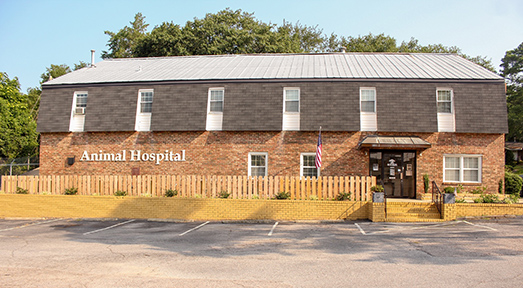
We enforce a closed surgery suite and are always equipped for both routine and emergency procedures. Every patient is carefully and appropriately monitored while under anesthesia. We are capable of performing a variety of procedures--including surgery on exotics.
All pets are closely examined by a veterinarian prior to surgery and pre-anesthetic bloodwork is always recommended to detect any underlying issues which may affect anesthetic protocol and/or surgical procedure. Pre-anesthetic bloodwork can be performed quickly on the morning of surgery using our modern in-house machines.
We maintain the most current and highest standards of anesthesia and analgesia as recommended by the American College of Veterinary Anesthesia and Analgesia. During surgery, your pet will be closely monitored by one of our technicians. Parameters including, but not limited to, heart rate, respiratory rate, SpO2 (oxygen content in the blood), blood pressure, temperature and anesthetic depth will be continually recorded into your pet's electronic medical record. An IV catheter will be in place to not only administer medications when necessary, but to also allow surgical fluids to be given. Surgical fluids are important in keeping your pet's blood pressure at a normal level, which results in appropriately perfused organs. We practice multimodal analgesia (pain control) to keep your pet comfortable before, during and after anesthesia.
Once your pet is in recovery, a technician will be at his/her side until they are fully recovered and comfortably resting in a heated recovery kennel. We will always call you once the procedure is finished and ease your mind that your beloved pet is safely waking up. Every pet is given the option of staying in the hospital the night after surgery at no additional charge. However, if you wish to take you pet home after surgery, a technician will go over your take-home discharge instructions and any medications in depth. We strive to provide the best client and pet service possible and will take ample time to go over any questions or concerns you may have before taking your pet home.
If your pet has been recommended a surgery, please call us to discuss. Our doctors and staff are always eager to discuss your needs and can often give a rough estimate over the phone even if we've never seen your pet.
Compared to film xrays, digital radiology allows our doctors to instantly capture images and more efficiently and accurately diagnose your pet's condition.
Your xrays can be copied to a disc, or emailed to you or any other veterinarians. We are also able to review the radiographs instantly in the room with you.
At some point in every pet's life, they will be faced with an illness. Sometimes these illnesses can be easily diagnosed and treated. However, there are a few diseases in pets that are more difficult to detect, diagnose and treat and can be life threatening if left un-diagnosed. When these more difficult diseases arise in your pet, you need a veterinarian that will offer the most complete, comprehensive diagnostics to best explain your pet's symptoms and how to best treat the disease.
At Forest Acres Animal Hospital, our veterinarians attend yearly conferences to continue their education past veterinary school and to incorporate the latest developments and trends into their everyday medicine.
Our modern facility allows our veterinarians to practice the most current medicine through use of:
Our veterinarians are experienced in the management of many diseases, including, but not limited to:
Veterinary laser therapy is a cutting edge tool that is used to provide a non-invasive, pain-free, surgery-free, and drug-free treatment that is used to treat a multitude of conditions or injuries. Laser can also be used in conjunction with other treatments to increase response time in healing. This type of treatment employs a deep-penetrating light to promote a chain of chemical reactions known as photobiostimulation. The process of photobiostimulation helps relieve pain through the release of endorphins to increase injured cellular healing, blood flow, and oxygen to the body.
While change can be seen in the first treatment with some animals, laser therapy usually takes multiple sessions upfront to see a change in the body; however treatments are cumulative so each additional treatment facilitates greater improvement in the animal’s condition. This can lead to the animal only needing maintenance treatments after improvements are seen. Please consult Dr. Graham or Dr. Peeler to see how many treatments they believe your pet will need based off of their treatment plan.
Radiographs may be needed prior to therapy
What Types of Conditions Can Laser Therapy Be Used To Treat?
